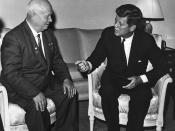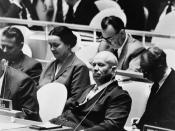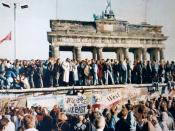Upon the death of Stalin in 1953, Khrushchev emerged as the Soviet Union's new political giant. The dilemma that he faced was to either continue preparing for US aggression as his predecessor Stalin did, or to make amends with the West to concentrate on the rebuilding of the USSR's war-torn economy, industries and cities. Khrushchev showed that he intended to appear to have chosen the latter through his domestic (including East European countries) destalinisation and liberalization, along with his international policies of 'peaceful co-existence' with the Capitalist countries. However, his measures taken in the uprisings in Eastern Europe, competition for control over Africa and Asia and the establishment of the Warsaw Pact, the propaganda war and the tension manifested in the Berlin Wall and the Cuban Missile Crisis made his 'peaceful' incentives altogether questionable and the attempt at peace an overall failure.
In the matters of domestic policies, Khrushchev brought Eastern Europe a brief Detente through his criticism of Stalinist diplomacy and brutality in the 20th Party Congress in 1956, requesting of summit meetings between officials of the US and the USSR, along with the tolerance of leaders such as Tito, who had aberrations to the Russian Communist mold.
Khrushchev claimed in his famous 'secret-speech' that there were only two ways the Cold War relations could go, "either peaceful co-exsistence or the most destructive war in history." Consequently, riots in East Berlin broke out immediately after Stalin's death, and Poland, Hungary, and Czechoslovakia all protested in one form or another in 1965. Instead of immediate suppression, the new Premier strategically placed leaders like Gomulka, Nagy, and Kadar in the rioting nations to lessen the severity of Soviet control. Though the Hungarian uprising in Budapest, October that year, ended as a massacre of about 4000 people, Polish ex-political prisoners badmouthed the...


